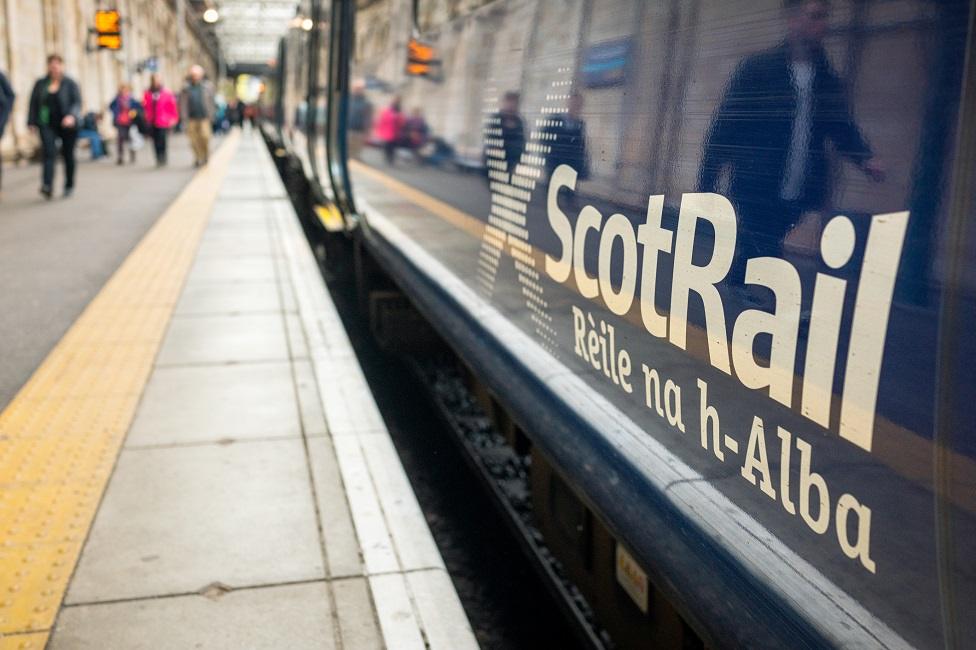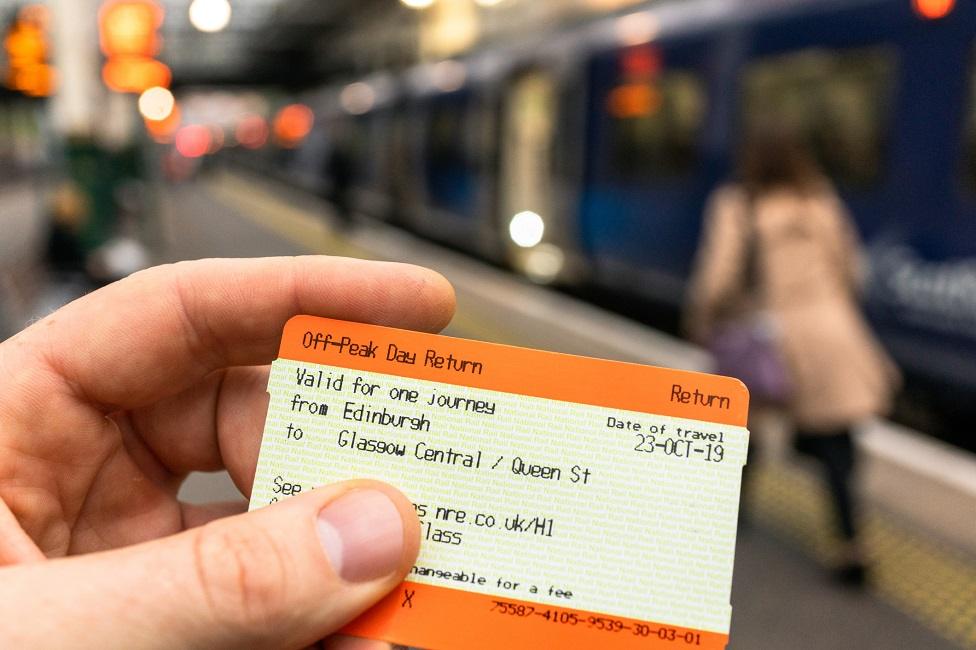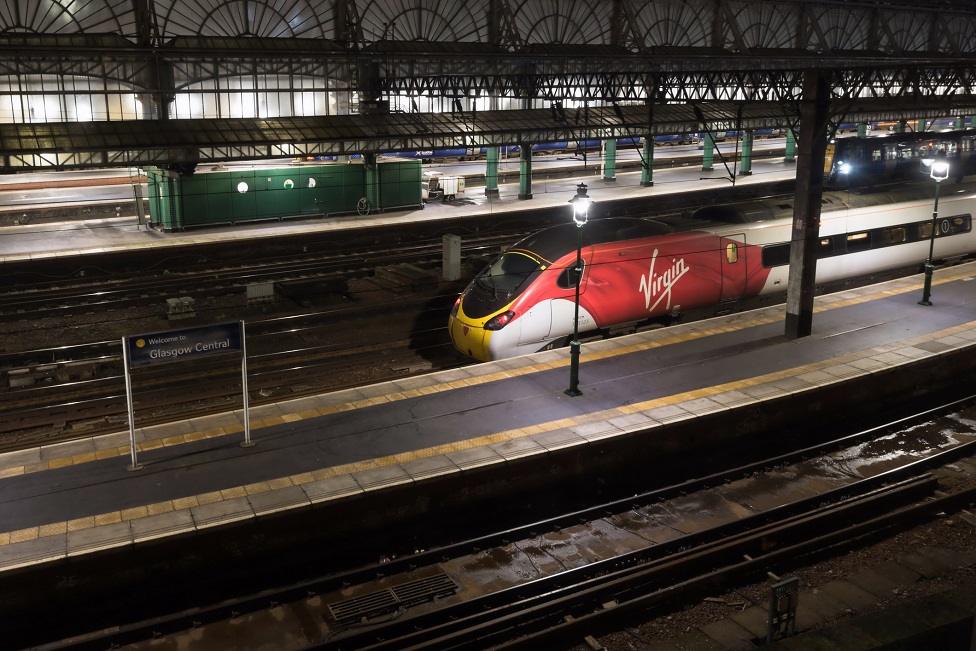General Election 2019: Big changes ahead for UK railways
- Published

Whoever wins the Westminster election, there are big changes coming down the track for Britain's railways
A major review is looking at the short-changing of passengers, and their perception of incompetence and greed for profit
One area that is overdue for a move out of the 1950s is in ticketing, though the end of 'turn-up-and-go' could meet resistance
It's a brave politician who rips up rail fares 10 days out from a general election. If there's one thing we've learned from a quarter century of franchising and private provision, nothing about running British trains is simple.
But with the Labour Party now pledging a third off rail fares in England, a giveaway is something simple that voters can understand and might like. It comes at a high cost, of course, and the formula for funding Holyrood would mean a dollop of additional moola in the block grant for MSPs to use as they choose.
The next bit of Labour's plans - changing ticketing - should be a lot less expensive for the taxpayer, but trickier.
It is, however, long overdue. Even without a Labour government, there's change afoot for the railways. The Scottish government should have an announcement ready to go after the Westminster election, on whether it will take a time-limited opportunity to shorten the current ScotRail franchise. This has the potential to open up the main Scottish franchise to a public sector operator, replacing Abellio in 2022.
Conservatives have lost patience with the franchise system they introduced in the 1990s. Last year, under Transport Secretary Chris Grayling they commissioned a review from Keith Williams, deputy chairman at John Lewis and former boss at British Airways.
His recommendations were due for publication this autumn. Remember the fuss about the Queen's Speech? Well, it was in there, with the promise of a White Paper, setting out plans for legislated reform. But it seems the election got in the way.
Horizon-scanning
So whatever the outcome, we can expect to hear more about railway reform in 2020. The Williams Review may have too much of a private-public mix for Labour's liking, but it is likely to have some other observations of use to anyone who aspires to propel Britain's train network down the track into the middle of the century.
As one of the projects to inform the review, future scenarios look at the question of how much commuting will be changed by remote working and an end to the 9 to 5 commute. With more older people having leisure travel on their minds and grandchildren at a distance, there's potential growth there.
But if trains don't keep pace with changes elsewhere, will the autonomous electric car, and Uber-esque car sharing become the preferred mode of long distance transport as soon as 2040?
There's an appetite for railway hubs to become the focus for cities. Look where shops and banks prefer to locate now, and you'll find the throughput of travellers give station concourses and surrounding retail outlets a premium rental price. That horizon-scanning report suggests that stations themselves could become the hub for work meetings for those working from home.

The digital future presents a challenge for rail. It communicates on a much slower network than most of us using smart phones. With an upgrade to a truly digital level of operations, it could become more efficient in managing use of track, including a reduced time gap between trains.
Off peak
Virgin Trains - which will wind up its operation of West Coast Main Line on 8 December having lost out to a joint venture between First Group of Aberdeen and Trenitalia, the operator of Italy's high-speed network - suggested some truly radical changes to Keith Williams. If real competition were driven onto the rails, slots would be priced at stations in much the same way as landing slots at a busy airport. That way, different operators could compete on the same routes.
But a more modest set of suggestions on ticketing chimes with the observations coming from Keith Williams as he has updated the industry on his thinking through the past year.
Coming from the airline industry, he looked back to 1994 when it first looked at e-ticketing. By 2008, all airlines operating internationally had to provide digital ticketing. But railways remain stuck many years in the past.
The rules and regulation of ticket prices revolve around peak periods and off-peak. I'm told this dates back to the days when ticket machines were limited to only two settings.
And because, in many cases, off-peak are regulated and low, but peak are not, many rush hour trains run with most of their seats unfilled. A return has to be £1 more than a single, for reasons no-one can recall. And you have to know the system intimately to avoid being overcharged by purchasing a through-ticket.
So if airlines are to offer a vision of the way ahead, with which Virgin agreed, there could be a use of electronic surge pricing. Seats would cost more at peak periods, but they would be dynamically priced so that seats are filled.

Book at the right time, particularly if you book in advance, and like an airline, you could get a peak time journey more cheaply than if you walk up and buy. It may not be that welcome to people, like me, who are not great at planning journeys far in advance. And it is conceded that this would work much better on inter-city than on suburban and "regional" services.
Anytime
Indeed, the "turn-up-and-go" approach to inter-city trains is what makes them so hard to manage, say rail operators. Virgin wanted to require seat reservations on its Glasgow-London trains. That way, no-one would be standing, which is what you can expect on high speed trains on the European continent, such as the TGV in France.
But so long as British rail operators are required to sell "anytime" tickets, then they face surges of demand at peak times and no means to stop people crowding trains. In turn, that means uncomfortable, unhappy pre-booked travellers when there is a big concert or sports event to attend.
Keith Williams observes that the Great British train passenger has been poorly served over recent years, despite increased train capacity, new rolling stock and improved safety.
He discerns a need to tackle perception of both incompetence in running trains, and of misplaced incentives, directed at pleasing shareholders and regulators.
Whatever track the government is set on after the election on December 12, the Whitehall transport secretary looks set to have a blueprint for some big changes, and it will be a big task to drive them.
